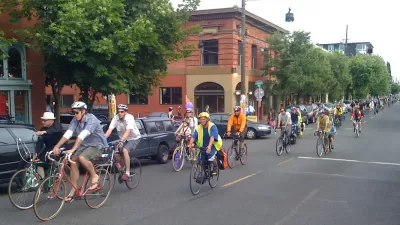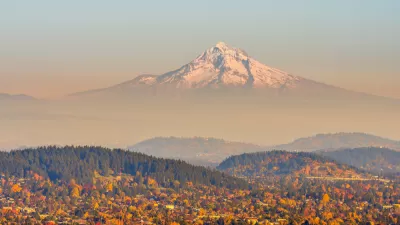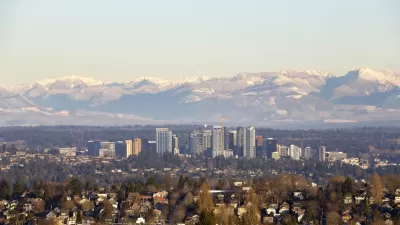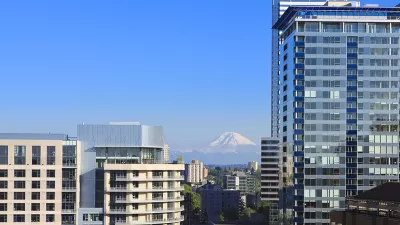While bike commuting is gaining nationwide, it's actually dropping in Portland which has held the enviable title of tops in bike commuting for large cities since 2005. Minneapolis and Seattle, #2 and #3 respectively, are gaining, warns BikePortland.

BikePortland's news editor, Michael Andersen, writes that according to the latest Census' American Community Survey estimates, the city's bike commuting rate dropped "from 6.3 percent to 6.1 percent of the city's working population. Across the whole Portland metro area, bike use held at 2.3 percent."
Minneapolis' bike mode share jumped from 3.4 to 4.5 percent, the sort of increase Portland hasn't seen since the 2007 gas spike. Seattle's rose from 3.5 to 4.1 percent. In each of those cities, the bike-commuting population grew by about 3,000 workers [compared to Portland's decrease of 65].
Worse yet, the drop is not restricted to cycling. "Public transit use in Portland dropped relatively sharply last year, from 13 percent to 11.1 percent of workers in the city limit" while the drive-alone rate increased "from 57.9 to 58.5 percent", Andersen writes.
The only positive commuting data was for walking which increased "from 4.9 percent to 6.9 percent, the highest walking mode share on record and the first time since 2007 that walking to work has been more popular among Portlanders than biking," he writes. Good news for walking was seen "in similar cities, too: from 9 percent to 9.9 percent in Seattle and from 5.8 to 7 percent in Minneapolis."
So, in terms of bike commuting, what are Minneapolis and Seattle doing that Portland isn't? Andersen doesn't explore that question, though in a July piece, he offers five explanations in response to, "What caused Portland's biking boom?"
Is it possible that there is a biking 'plateau', and Portland has reached it? Compare Portland's aforementioned commuting rates to the nation's to put it in perspective: "biking (0.6 percent), walking (2.8 percent), riding transit (5 percent) and driving alone (76.3 percent)".
FULL STORY: Census: Portland biking stalls for fifth year while other cities climb

Alabama: Trump Terminates Settlements for Black Communities Harmed By Raw Sewage
Trump deemed the landmark civil rights agreement “illegal DEI and environmental justice policy.”

Study: Maui’s Plan to Convert Vacation Rentals to Long-Term Housing Could Cause Nearly $1 Billion Economic Loss
The plan would reduce visitor accommodation by 25% resulting in 1,900 jobs lost.

Planetizen Federal Action Tracker
A weekly monitor of how Trump’s orders and actions are impacting planners and planning in America.

Waymo Gets Permission to Map SF’s Market Street
If allowed to operate on the traffic-restricted street, Waymo’s autonomous taxis would have a leg up over ride-hailing competitors — and counter the city’s efforts to grow bike and pedestrian on the thoroughfare.

Parklet Symposium Highlights the Success of Shared Spaces
Parklets got a boost during the Covid-19 pandemic, when the concept was translated to outdoor dining programs that offered restaurants a lifeline during the shutdown.

Federal Homelessness Agency Places Entire Staff on Leave
The U.S. Interagency Council on Homelessness is the only federal agency dedicated to preventing and ending homelessness.
Urban Design for Planners 1: Software Tools
This six-course series explores essential urban design concepts using open source software and equips planners with the tools they need to participate fully in the urban design process.
Planning for Universal Design
Learn the tools for implementing Universal Design in planning regulations.
Caltrans
Smith Gee Studio
Institute for Housing and Urban Development Studies (IHS)
City of Grandview
Harvard GSD Executive Education
Toledo-Lucas County Plan Commissions
Salt Lake City
NYU Wagner Graduate School of Public Service





























